Developing leadership
An organisation that seeks to boost Arab leadership in Israel, Kav Mashve, in cooperation with Edmond de Rothschild Foundation, brought 12 MBA students to Cambridge for an immersive Executive Education programme at Cambridge Judge Business School.
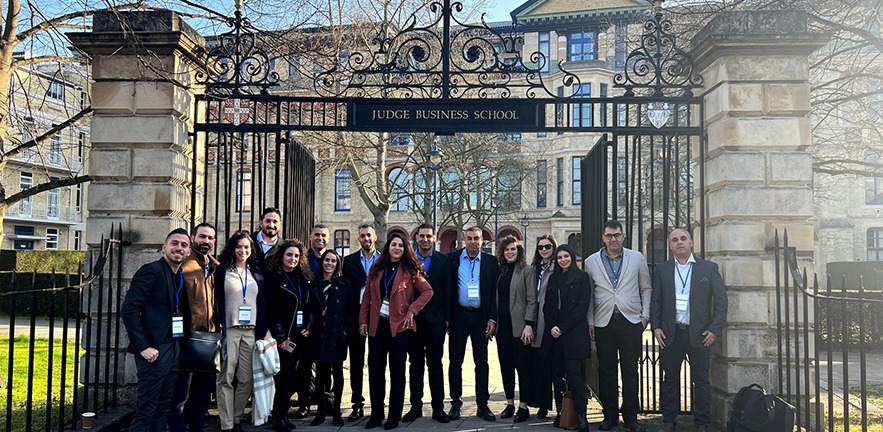
An Arab born in the northern Israeli city of Nazareth, Nisreen Salman says her worldview changed from the week she spent in the university city of Cambridge in March 2022.
“I always knew the importance of networks, but after my time in Cambridge I now invest a lot more time building a network and posting about things on social media,” says Nisreen, one of 12 MBA students from Tel Aviv University, all from the Arab community, who participated in an Executive Education programme at Cambridge Judge Business School organised in conjunction with Kav Mashve, a Haifa-based NGO.
How everyone has a role in making societal changes
“I’ve become much more proactive, not just at work but also in engaging with the community,” says Nisreen, a tax partner at KPMG in Tel Aviv. “We had some network events in Cambridge with Cambridge students, and we realised that we all have the same challenges in different situations. There are a lot of problems in Israel and it’s easy to say it’s the government’s role to solve it, but now I know it’s for all of us to make changes. The impact starts with us.”
Making a beneficial impact in Israeli society is the key goal of Kav Mashve, supported in part by the Edmond de Rothschild Foundation, which seeks to create a more inclusive and collaborative Israeli society through higher education. The Foundation initiates many innovative projects in Israel aimed at reducing social gaps and fostering young leadership, and one of those initiatives involves working with Kav Mashve to promote Arabs into leadership positions in Israel businesses.
Providing a role model for other Arabs in Israel is key
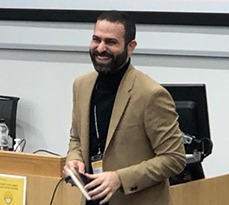
The Cambridge part of the programme, held 21-25 March, complemented participants’ learning at Tel Aviv University by providing a global leadership perspective that will allow them to advance in their careers and provide role models for other Arabs – who comprise 21% of Israeli society but just 13% of the workforce and a mere 0.3% of managers in leading companies in Israel, according to the Inter-Agency Task Force on Israeli Arab Issues.
“The study week at Cambridge Judge Business School provided our participants with an exclusive experience of in-depth academic content with a global perspective,” says Sami Asaad, CEO of Kav Mashve.
“The networking activity that the participants experienced with students from different countries studying in Cambridge opened up opportunities for them as well as an exchange of ideas and diverse perspectives. Undoubtedly, this week in Cambridge is a major landmark in the lives of our participants and is a significant anchor for the development of their personal and leadership careers.”
Participants have seen promotions and other advancement
About 90% of the first cohort in the programme, who began in Tel Aviv in 2020, have already achieved promotions or extensions to their workplace roles, says Jiska Cohen, Director of Resource Development at Kav Mashve. The first cohort graduated from the programme in November 2022, and a second cohort is already underway at Tel Aviv University. This new cohort will visit Cambridge for that part of the programme in early 2024.
“It’s incredible meeting the people on this programme, as they have already had to put in so much effort to get where they are due to a glass ceiling for Arab professionals in Israel,” says Jiska Cohen. “Many Arabs in Israel feel that it doesn’t matter what they do, even if they have the best grades, they lack courage to ask for a promotion. We show them on this programme that they’re more than entitled, and we aim to help build their self-esteem.”
Cambridge Judge is one of 3 programme pillars
The programme’s roots go back to October 2020, when Kav Mashve in cooperation with the Edmond de Rothschild Foundation launched its first Al-Mada programme – named from the Arabic term for “horizon” or “everything your eye can see”. Al-Mada is an intensive 2-year senior leadership development programme that aids the development of business leaders among Arab university graduates by providing tools and concepts for personal development.
The programme is open only to Israeli Arab university graduates who have worked for at least 5 years in the Israeli business sector and are recommended by their employers for future promotion, and the programme has 3 main pillars: Academic (an MBA degree at the Coller School of Management at Tel Aviv University; Leadership (training by the Institute for Quality Leadership) and Global Leadership (the programme at Cambridge Judge Business School).
Maram Jubran Mireb, the Al-Mada Programme Director, said of the Cambridge pillar:
“It was an amazing experience! During the study trip in Cambridge, we were exposed to the highest academic level by impressive and interesting lecturers, and innovative academic content relevant to the changes in the world today. And of course, we were privileged to meet academic and administrative staff who work at very high standards, with excellent human relations, openness and a desire to take into account the diversity that exists in the Al-Mada programme.”
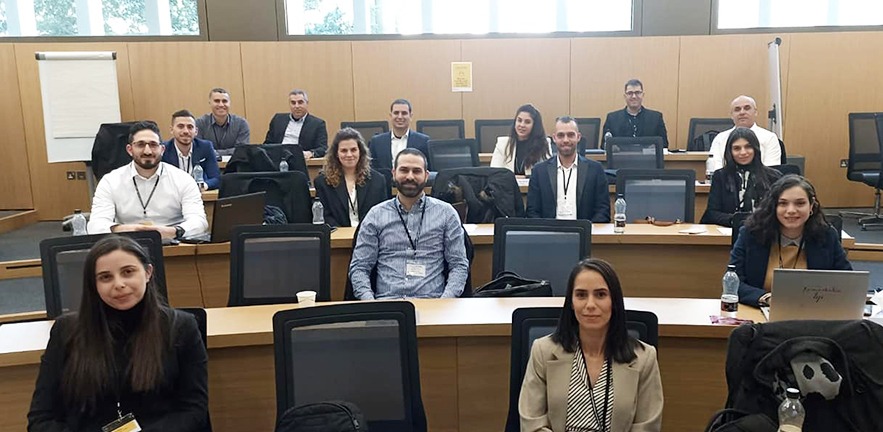
Shifting the ‘equality line’ for Arabs in Israel
The name of the NGO, Kav Mashve, is a play on words in Hebrew: it can refer to the “equator” but also to “the equality line” in terms of social justice and equality.
“A key goal of the programme is to provide role models for others,” says Elli Booch, Director of Philanthropy at the Edmond de Rothschild Foundation. “When a person from the Arab community comes into the business world and sees someone from the Arab society in a management position, they say: ‘I can be there’, and the youth see an opportunity not only to get into the business world but get into a position of influence.
“The connection to Cambridge specifically is that we want to give this group the best of the best in terms of the quality of the education and training they get. It’s not just giving them a management course, we want to give them the best.”
Experiencing Cambridge’s history while looking to the future
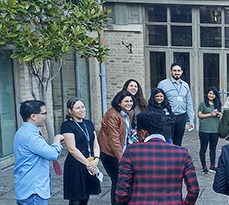
Another participant on the Al-Mada programme, Amjad Egbaria, recalls fondly the historical aspects of Cambridge, including a candlelit dinner at a 16th century dining room at Magdalene College, tales about Albert Einstein visiting the city, and the University’s many Nobel Prizes. Yet his main takeaways from the programme point to the future and not just Cambridge’s illustrious past.
“We learned in Cambridge how to build a future case – what might happen in the future and how to respond to it – based on facts different from the present,” says Amjad, who recently shifted gears within his telecoms company Amdocs from software engineering to product management. He now supervises 25 people in 2 teams compared to 4 people in a single team before coming to Cambridge.
“For example, we looked at a future world powered entirely by green energy, with no black energy or fossil fuels like we have now, and what that world would be and what opportunities there would be. I’ve already applied this technique with my product developers, to teach them how to brainstorm on finding opportunities.”
Showing that there is a world outside of Israel
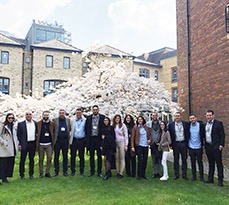
Allègre Hadida, Associate Professor in Strategy at Cambridge Judge and a Fellow of Magdalene College, was the Academic Programme Director of the Executive Education programme at Cambridge Judge, and also taught 2 modules.
“We wanted the participants to realise that there’s a world outside of Israel and there are global challenges they can address,” says Allègre, a native of France who has done extensive academic work in Israel.
“The programme in Cambridge included Cambridge Union-style debating, storytelling (including a fun comparison of Cambridge to the Hogwarts of Harry Potter fame), and connections with MBA students at Cambridge Judge. We thought it was important to meet their peers, students with different backgrounds and different educations, to compare experiences and build bridges among young professionals across geographies, occupations and cultures.”
The Cambridge Judge faculty for the March programme also included Patrizia Vecchi, Assistant Professor in Organisational Behaviour; Daniel Ralph, Professor of Operations Research; Juliana Kozak Rogo, Management Practice Associate Professor; Stella Pachidi, Assistant Professor in Information Systems; Shahzad Ansari, Professor of Strategy & Innovation; Jaideep Prabhu, Professor of Marketing; and Khaled Soufani, Management Practice Professor of Financial Economics & Policy and Director of the Circular Economy Centre at Cambridge Judge.
Five themes ranging from strategic leadership to innovation
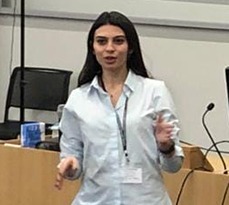
The 5 days were divided into themes:
- Strategic Leadership
- Globalisation
- Ecosystem Leadership
- Innovation
- Global Challenges.
Besides the opening-night dinner at Magdalene, there was a closing dinner at Downing College, and a top executive at Cambridge-based pharmaceutical firm AstraZeneca spoke to the group on leadership and innovation.
Like Nisreen Salman, programme participant Alaa Hbaish said the Cambridge lessons on networking were eye-opening.
“Patricia Vecchi gave us a questionnaire and that gave me the understanding that although I do have a network I am not fully using my network,” he says. “I now see that networking is important for my own benefit but also for business development, because there are people with different capabilities from different fields who can contribute to my knowledge and experience.”
Creating jobs for Arabs in a small town in northern Israel
Alaa, who was born and raised in the northern Israeli Druze village of Yarka, is now Acting General Manager of Innovisec, a tech-based innovation security of the ICTS Europe security-solutions firm, which set up a software office in his hometown that now employs 8 people – all of them Arabs.
“It might seem like a small number of employees, but for a village of 16,000 people in the north of Israel with no high-tech companies it’s a really big thing,” he says.
Alaa says Allègre Hadida urged participants to “always scan our horizons – look as far as you can and slowly plan things, but always look at the horizon. I now scan the horizon for business opportunities, and in the last 2 weeks I was able to increase the budget and bring in 2 new employees in my team as we have proposed some new projects.”
Showing others that the Arab community isn’t ‘like this’
Another programme participant, Raghad Khamis, recently shifted career gears from the private sector to work in finance for Rectify, a Tel Aviv-based e-commerce company that is publicly listed on the NASDAQ exchange in New York.
“I’ve been the only Arab in about every company I’ve worked, and it’s important to change the mindset about Arabs in Israeli society,” Raghad says. “I’ve studied in Israel, lived 8 years in Tel Aviv and have Jewish friends, but for many people I’m the only Arab they know, so it’s important to show people that Arabs aren’t ‘like this’ in a certain way.
“The week in Cambridge was very challenging, and that gave me a lot of confidence,” says Raghad, who was also born in Nazareth. “I’ve studied at Tel Aviv University and American University in Washington, DC, and it was amazing to hear the professors at such a prestigious place as Cambridge.
Cambridge t-shirt is a big conversation starter
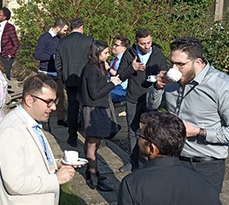
“I bought a ‘Cambridge’ t-shirt when I was there, and it’s now a conversation starter. People ask: ‘Were you really in Cambridge or did you just get it on Amazon?’ I’ve really grown workwise since I was in Cambridge, and in the interview for my new job I talked about the challenges and the deadlines in Cambridge, and how we really had to organise.”
Mwassi Ahmad, Programme Officer for Arab Society at the Edmond de Rothschild Foundation, says the Cambridge element of the Al-Mada programme is a vital component of the broader experience.
“I know from personal experience that as an Arab in Israel I’m always comparing myself to Jews in Israel, but as soon as you get outside and gain an international perspective you exit the small bubble you’re in and stop comparing Jews and Arabs. That’s why it’s so important to have this more global perspective in Cambridge.”
Sustainability lessons for future generations
Amjad Egbaria said one very global perspective he gained in Cambridge focused on the crucial issue of sustainability through a module taught by Khaled Soufani, Director of the Circular Economy Centre at Cambridge Judge.
“We did a workshop on how to use material from an old smartphone and reintegrate it into other products,” says Amjad, who hails from the city of Umm Al-Fahem in northern Israel’s Haifa District. “We’ve already applied these principles to our offices in Israel, and I’ll keep those sustainability lessons with me in the future: when I raise children, I’ll teach them not to throw away a new phone a year later.”
How the programme reflects commitment to diversity and inclusion
The Executive Director of the Executive Education division of Cambridge Judge, Beth Ahlering, says the Al-Mada programme is a very important initiative for the business school. “The Al-Mada programme illustrates how Executive Education at Cambridge Judge encompasses so many elements – serving not only companies but also NGOs like Kav Mashve and governmental organisations who are working for a better future globally,” she says. “We’re particularly proud of the Al-Mada programme because it reflects Cambridge Judge’s commitment to diversity, equity and inclusion, and we can’t wait to welcome the next cohort to Cambridge in 2024.”


.png?width=352&name=climate%20change%20(1).png)
